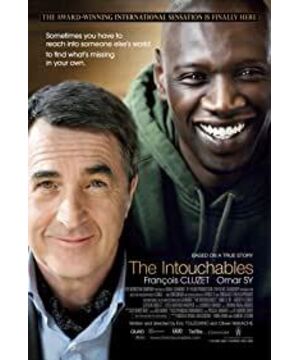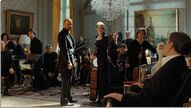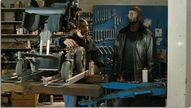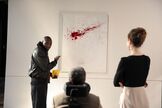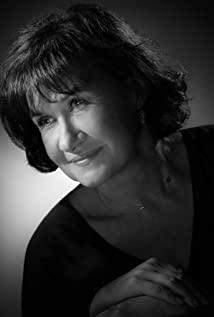At the beginning of the film, during the interview, Driss, the little gangster, compared all the other candidates.
Take a look at how those "intellectuals" with various diplomas returned to Marguerite's questions: stammering, nonsense that can't find words. I still remember the sentence "Very old, very old woman, she is really...", I thought he would say a few words, and the result: "She is really...very old." Nonsense! . What else is "helping the disabled reintegrate into society" (the word "reintegration" in French is used exclusively for prisoners from reform-through-labour...), are you a tycoon "enjoying housing subsidies?" These answers are really compelling: this Group of idiots.
And Driss showed his sense of humor as soon as he came. Knowing that Margaret asked about his resume, she was able to draw the question to the music by playing word games. And when Philip thought he was better in music, Driss unceremoniously ridiculed Philip, who was well versed in classical music: "No matter whether it is music or a sense of humor, you don't have any."
And the next day, when Driss came to Philip. The family took the autograph, and when he learned that he was hired, he was surprised and said to Philip: "I made a mistake, it turns out that you have a sense of humor." I have to say that his brains are turning very fast, and he is still born. Humorous person.
Driss is also good at giving people nicknames. The most obvious one should be the "feather duster". When Alisha's male classmate asked Driss where he had beer, Driss noticed his hair and replied, "Look for it in your hair." The nickname of "feather duster" should also be bred there. And one of my favorite nicknames is the nickname he gave to female staff in the gallery: "Mrs. Simpson". He was so convincing, he compared the female staff's haircut to Mrs. Simpson's blue cake head. The female staff member in Paris will get angry when she hears it. And the neighbor who parked the car, the male classmate with the feather duster, the man sitting next to Driss at the birthday party, and even Philip, who had a beard of various lengths, became the object of Driss's mouth. His ability to give you a nickname in just a second is enviable.
The phrase in the gallery, "Without arms, there would be no chocolate" is also a magical touch. In France, this sentence is usually said to children, and the underlying meaning is that if you are not behaved, you will not eat chocolate. This unintentionally blurted idiom used Philip, like Driss said, a bit too much, but it's a pun.
There is more than one joyful dialogue in the gallery. When "Mrs. Simpson" talked about the price of the painting, Driss, who was born in the market, said in surprise: "You better check." Then, when the female clerk said with an apologetic look: "I made a mistake...actually more expensive", seeing Driss's triumphant expression instantly freezes, which makes people laugh. There are also those few sentences, "If a person has a pool of nosebleeds on the canvas, it costs xxxx euros?" "If you give me 50 euros, I can give you a similar painting, and I can also get some blue as a reward. "For me who don't understand art, Driss really said that I'm gone. Whee.
Driss's mother (aunt) also has a sense of humor. She compares the precious craft eggs stolen by Driss to the chocolates that French people often eat (you know how to eat kinder surprise children's shoes), and also questioned Driss. When it can be used to pay the rent, I secretly cried out, yes!
In the restaurant section, the conversation about food should have made many people laugh. Driss, who has not eaten semi-melted chocolate, said to the waiter, "The chocolate just now was not cooked." He didn't think it tasted good, so he told the waiter bluntly. There is also the theater section, "A tree that can sing". How many people have the courage to express their thoughts in the public, and ignore the ridicule around them? This reminds me of those subjects in "The Emperor's New Clothes" and those arty people in real life. Compared to Driss, they are inferior.
On the plane, it was obvious that Philip was black near the ink, and learned the Driss-style humor. When encountering air currents (or something else, the plane was shaking anyway), he said to Driss, "It's okay, it's just that the fuselage has a It's just a hole." And Driss responded: "You are used to tragedy, but I am not." Indeed, in his eyes, Philip (or other disabled people) is no different from a normal person. He can make jokes about his tragedy or disability without hesitation, but it can also make people feel that those are just kind jokes. There is also the same dialogue: "Without arms, there will be no chocolate"; in the theater, the Yankee loves to beat his wife (he shouldn't have seen "Welcome to the North"), but "With you (Philip), don't worry about this. "And the "disabled Nazi" that shaved the beard at the end.
There is another scene that I laugh every time I watch it. After Alisa was dumped, a person committed suicide in the room. After being seen by Driss, the phrase "This will only make you constipated for 3 months" and finally, after refusing Alisha's request, but from the door The sentence that poked my head and asked: "How much can you pay?" It made me laugh. This also makes his nature clear at a glance. Sometimes I feel that if there is such an unreliable brother or friend who can rely on him, it is a very happy thing.
Then, at Philip’s birthday party, Driss’s comments on classical music were really, hahahaha! What is "a group of streaking people", "cats and mice", "coffee advertisements", "Unemployment Compensation Center Phone Ringing-the waiting time is about 2 years". What kind of imagination and life experience are needed to say these humorous sentences? No wonder Philip was going to yell "Help" at last.
To be honest, I don't like Margaret very much. I don't discriminate against lesbians, but she always teases Driss and makes me unhappy. Does her self-confidence stem from her low self-esteem? Of course, Driss is not so easy to defeat. When he learned the truth, Marguerite still didn't forget to play with Driss, pretending to make a 3P suggestion. At this time, Driss responded unceremoniously, "Then we will No more kisses on the cheek." Then she patted Marguerite on the shoulder and said, "Goodbye, buddy." People can't help but sigh, the word "buddy" is really good! Revenge! Ha ha. Of course, this does not mean that he is a stingy and hateful person. Do you remember his response to Yvonne when he asked if he would be angry? "Good job" "I think why she didn't get my bait, this is something that has never happened before." A few words of self-ridicule took the topic over.
The end of the Driss application period echoes the beginning of the film. Remember how Driss played word games and brought the topic to music? But at that time he just wanted an autograph to receive unemployment benefits. Now he really wants to find a job, but that can't stop his unlimited humor. Goya, the painter, reached Driss and became a female singer, and "there is nothing after pandi panda (song title)." He can really talk. Of course, at this time, Driss also had a certain understanding of art under the influence of Philip. At a glance, I can tell that the painting is Dali's "Eternal Memory", and he is very expert in calling the table in the painting a mole (who can find a suitable translation of this word?). What else is Alexander...Driss, you are much better than me.
I think this movie has the deepest impact on me, first is Driss's countless humorous dialogues, and then those warm scenes. Many of them should have the same feelings as me, so I watched the whole movie crying and laughing.
PS: Finally, there is a little yellow dialogue. "His little cucumber." Remember what appeared in that paragraph? Ha ha.
There are too many laughs in this movie, and everyone is welcome to add.
PPS: Finally, make a small advertisement, students who are interested in participating in French subtitle production, please add this qq group 172893602
View more about The Intouchables reviews


